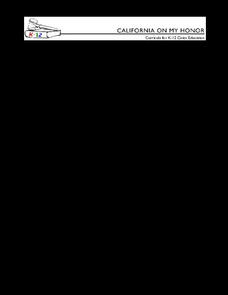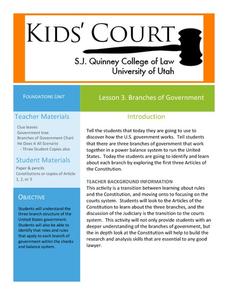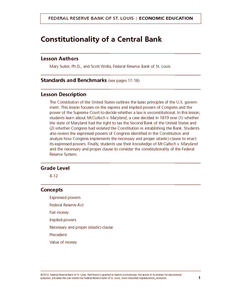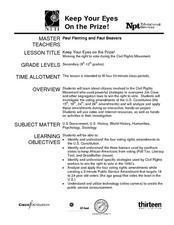Judicial Branch of California
Planet Fourth Grade is Researching the U.S. Constitution
Using the Constitutional Convention as a model, learners create their own governments. Other activities to explore the American Constitution include creating posters to help explain the Bill of Rights.
Curated OER
Lesson 2: The Constitution: Our Guiding Document
Explore the structure and content of the US Constitution in the second lesson of this five-part social studies series. A collection of activities, games, and videos complement a class reading of a document summarizing the US...
Curated OER
Lesson 3: Branches of Government
Young historians climb through the three branches of the US government in the third lesson of this five-part series. While reading the first three Articles of the Constitution in small groups, children write facts on paper leaves that...
National Endowment for the Humanities
Lesson 2 James Madison: The Second National Bank—Powers Not Specified in the Constitution
How much power is too much power for the federal government? Scholars use primary documents and constitutional research in groups to analyze the creation of the Second National Bank under James Madison. This is the second lesson of a...
National Constitution Center
To Sign or Not to Sign: The Ultimate Constitution Day Lesson Plan
Learners examine the ratification process. For this U.S. Constitution lesson plan, students discuss the ratification process and read a play based on the process. Learners debate the ratification process and determine whether they...
Center for Civic Education
What Basic Ideas Are in the Preamble to the Constitution?
Introduce young historians to the US Constitution with this upper-elementary social studies lesson plan. Beginning with a general discussion about the role of government in society, students go on to work in small groups identifying and...
Center for Civic Education
What Basic Ideas About Government Are Included in the Preamble to the Constitution?
Young historians explore the meaning of the Preamble to the US Constitution in this upper-elementary social studies lesson. Working with partners or in small groups, children discuss the purpose of government before reading and analyzing...
Center for Civic Education
Constitution Day Rap
Engage your class while learning about the US Constitution with this fun primary grade social studies lesson. After viewing a picture of the US Constitution, young learners piece together a US flag using stars and stripes with facts...
K20 LEARN
Tribal Sovereignty and the Indian Reorganization Act: Tribal Governments
Sovereign nations or wards? High schoolers investigate the history of the Indian Reorganization Act and other legislation that impacted Native Americans. They also research different tribes' constitutions, compare them to the U.S....
Constitutional Rights Foundation
Naturalized Citizens and the Presidency
Article II, Section 1 of the U.S. Constitution takes center stage in a lesson that asks class members to assume the role of state senators, debate a resolution to amend the U. S. Constitution to permit naturalized citizens to run for...
Curated OER
The Bill of Rights is for US Today
The first ten Amendments of the U.S. Constitution are vital for young people to understand. Provide the foundation of the laws that govern our country with this junior high school lesson. Groups use the newspaper to identify rights...
National Endowment for the Humanities
The Preamble to the Constitution: A Close Reading Lesson
"We the people of the United States, in order to form a more perfect union..." These familiar lines begin the Preamble to the Constitution, but do learners know what they mean? A close reading exercise takes a look at the language of the...
National Endowment for the Humanities
Ratifying the Constitution
Ratifying the Constitution was no simple task. Using primary sources, such as classic writings from the Federalists and Anti-Federalists, young scholars examine the arguments for and against the Constitution. They then decide: Would they...
James Madison Memorial Fellowship Foundation
Those "Other Rights:" The Constitution and Slavery
Did the United States Constitution uphold the institution of slavery, or did it help to destroy it? Young historians study Article 4, Section 2, Clause 3 of the Constitution and evaluate the rights of slaveowners as they compared to or...
Alabama Department of Archives and History
Alabama's 1901 Constitution: What Was at Stake?
Who should be able to vote? As part of a study of the 1901 Alabama Constitution, class members examine primary source document that reveal the reasons the authors gave to support their positions on this question and their assumptions in...
Center for Civic Education
What Is Authority?
Young scholars examine the concepts of power and authority as they begin learning about government in this elementary social studies lesson. Through a series of readings, discussions, and problem solving activities, children learn about...
Federal Reserve Bank
Constitutionality of a Central Bank
Considering the expressed and implied powers of Congress, was it constitutional for the United States to establish the Second National Bank in the early nineteenth century? What is the constitutionality of the Federal Reserve System?
Curated OER
Keep Your Eye On the Prize
High schoolers learn about citizens who were actively involved in the civil rights movement, and the strategies they used to overcome the Jim Crow laws that were so prevalent in the 1960s. They investigate the voting amendments of the US...
National Endowment for the Humanities
Lesson 4 James Madison: Internal Improvements Balancing Act—Federal/State and Executive/Legislative
Who has the power? The founding fathers asked the same question when the United States was formed. Learners explore issues that arose during Madison’s presidency that raised constitutional questions. Through discovery, discussion, and...
Curated OER
The Branches of Government
After reviewing and reading about the three branches of US Government, complete this activity with your class. In groups, they will place their "cards" on the board under the correct branch. This lesson is weak and unclear. I'd make a...
Curated OER
What is Meant by Returning to Fundamental Principles?
What did the Founding Fathers mean by the importance of continually returning to fundamental principles? Your young historians will analyze a series of quotations illustrating the fundamental ideals and principles of the United States...
Constitutional Rights Foundation
If Men Were Angels: Teaching the Constitution With the Federalist Papers
Much like the methods of group work, the writers of the Federalist Papers worked together to advocate for their viewpoints against the anti-federalists. The resource enables learners to break into small groups and conduct research before...
iCivics
Wanted: A Just Right Government
What type of government did American colonists gain and seek after gaining their independence after the Revolutionary War? Here is lesson that will guide your young learners through the new nation's progression from the Articles of...
City University of New York
Electoral College
A presidential election is a lot like the 2004 World Series, and it's also a lot like choosing an orange in a paper bag. Apply the process of the electoral college to these two analogies with a set of lessons about government...

























